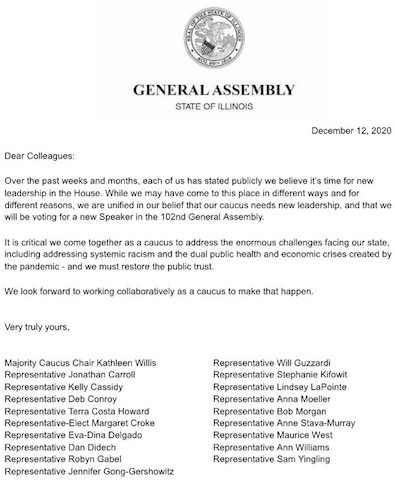* You’ll recall that 6 House Democrats sent the 19 Madigan refuseniks a letter this week informing them that their opposition to reelecting the longtime House Speaker was fueling the opposition and asked them to unite. Their response was sent today…

*** UPDATE *** Tribune…
Rep. Jonathan Carroll of Northbrook, one of the 19, said the group was “prepared to dig in our heels” in its opposition to Madigan’s reelection.
“The message we wanted to send is that we are of differing backgrounds, differing political perspectives, but the one thing that we are unified on is that we will not be supporting Mike Madigan for the 102nd General Assembly. These are 19 ‘no’ votes and we’re pretty comfortable with where our position is,” Carroll said.
Carroll said that it has been frustrating that the full caucus of the 73 House Democrats has not been held, either in person or virtually due to the pandemic, and suggested it is an effort by Madigan to buy time to try to persuade the dissidents to come back into the fold.
“The speaker falls into that category of being a great tactician who is sitting there right now looking to say, ‘What can I do to stall this process?’” Carroll said. “My guess is time buys him the ability to potentially flip certain members and I think the statement we put out is pretty much, ‘You can have all the time you want. We’re not flipping.’”
* WBEZ…
Writing collectively for the first time, 19 Democratic state representatives issued a joint statement Saturday reiterating that they remain committed to not voting for Michael Madigan to be speaker of the Illinois House of Representatives. […]
The statement from the 19 House Democrats comes two days after they received a letter obtained by WBEZ from six of their Democratic counterparts — including Rep. Michael Zalewski, D-Riverside, who asked them to “come together as a family,” and talk about a “path forward for us all.” […]
Zalewski seemed to take the letter from the 19 on Saturday as an encouraging sign.
“I appreciate and welcome an area of agreement over the last couple days: We need to come together collaboratively because the work ahead is critical for the State of Illinois,” Zalewski wrote in response to Saturday’s statement from his 19 colleagues.


















